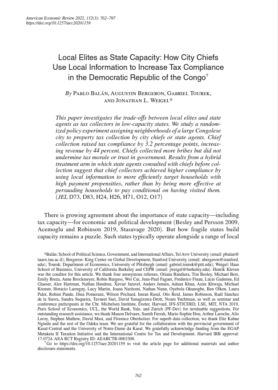American Economic Review Vol. 112, No. 3, March 2022 (pp. 762-97)
This paper investigates the trade-offs between local elites and state agents as tax collectors in low-capacity states. We study a randomized policy experiment assigning neighbourhoods of a large Congolese city to property tax collection by city chiefs or state agents. Chief collection raised tax compliance by 3.2 percentage points, increasing revenue by 44 percent. Chiefs collected more bribes but did not undermine tax morale or trust in government. Results from a hybrid treatment arm in which state agents consulted with chiefs before collection suggest that chief collectors achieved higher compliance by using local information to more efficiently target households with high payment propensities, rather than by being more effective at persuading households to pay conditional on having visited them.
